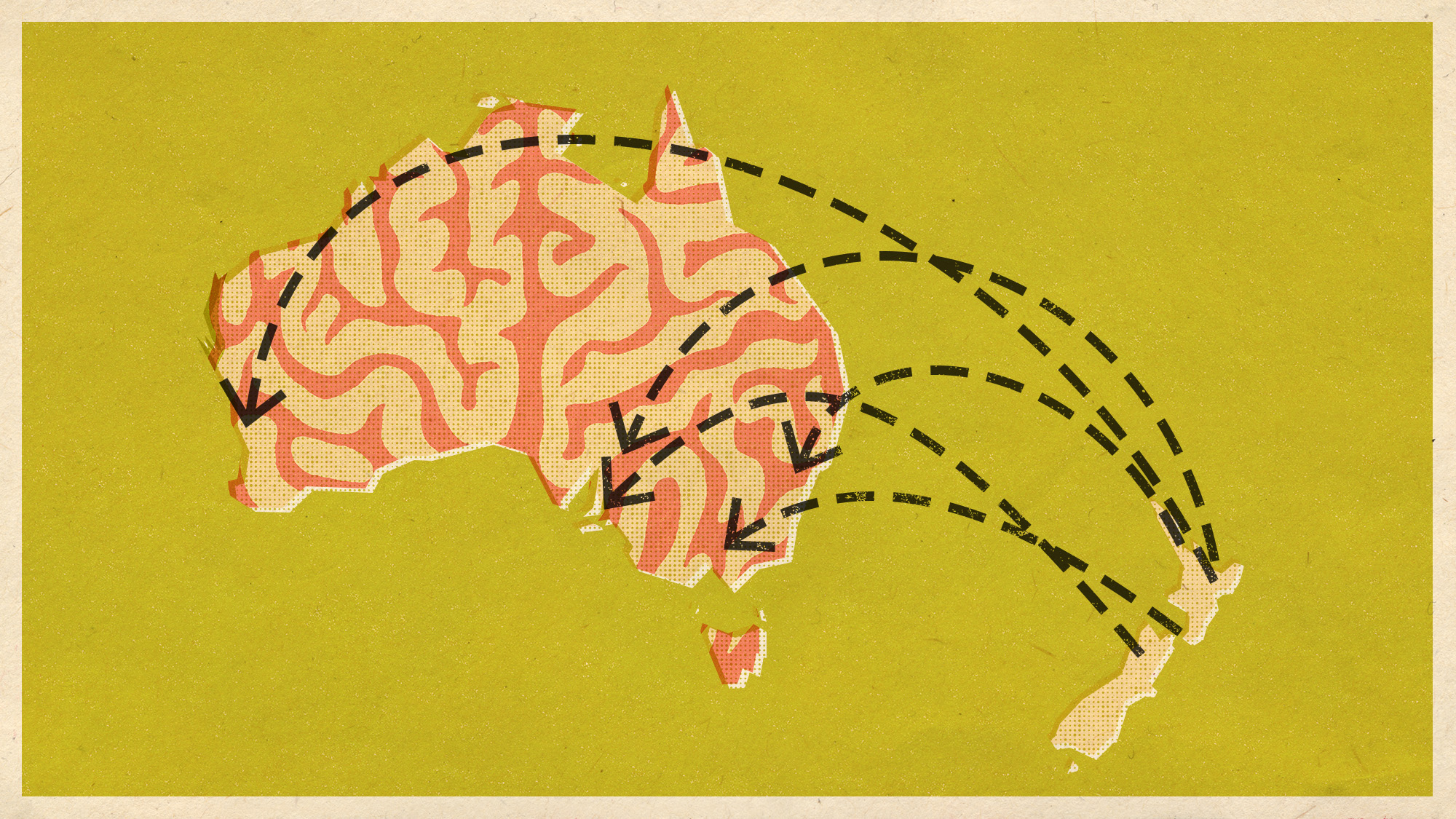'Brain drain' fear as record numbers leave New Zealand
Neighbouring Australia is luring young workers with prospect of better jobs

A free daily email with the biggest news stories of the day – and the best features from TheWeek.com
You are now subscribed
Your newsletter sign-up was successful
Record numbers of people are leaving New Zealand as the cost of living crisis is being compounded by limited job opportunities.
In a "significant exodus", the year to April 2024 saw a net migration loss of 56,500 citizens, up 12,000 from the previous record, said Firstpost. With fewer people arriving in New Zealand, there are fears of a brain drain and skills shortage.
'Grim picture'
Many young New Zealanders opt to go travelling overseas and the recent surge in the number of people leaving the country can partly be explained by a backlog caused by people delaying their plans due to the Covid pandemic.
The Week
Escape your echo chamber. Get the facts behind the news, plus analysis from multiple perspectives.

Sign up for The Week's Free Newsletters
From our morning news briefing to a weekly Good News Newsletter, get the best of The Week delivered directly to your inbox.
From our morning news briefing to a weekly Good News Newsletter, get the best of The Week delivered directly to your inbox.
But although this sort of travelling is considered a "rite of passage", much of the "record flow" is due to the "growing attraction" of working in Australia, said The Guardian. And experts worry that a "grim economic picture" means "departing Kiwis" may never come back.
With New Zealand experiencing a second recession in less than two years, employers in neighbouring Australia are trying to lure New Zealanders with offers of higher pay and better working conditions.
Half of the New Zealanders who left recently have moved to Australia. Brad Olsen, principal economist at Infometrics, said this "suggests a greater number of people and families are looking for opportunities and making a more permanent move".
'Goodbye dinners'
Kirsty Frame said she left New Zealand in 2023 aged 24 after it "just felt like bad news after bad news" in the country. She had already noticed the growth in departures, remembering that "it was goodbye dinner after goodbye dinner, leaving drinks after leaving drinks".
A free daily email with the biggest news stories of the day – and the best features from TheWeek.com
After arriving in Melbourne she found a higher-paying job and a flat with lower rent. She "could be happy here for a long time", she told The Guardian, and she thinks she will be there "for the long run".
Maia Vieregg, a 26-year-old geologist, has found the transition harder. She left New Zealand after becoming "cynical and hopeless" about its future as she struggled to find work and the progressive government lost power.
She found a well-paying job a couple of hours north of Sydney but she's finding Australia difficult to adjust to, as she finds it more materialistic than New Zealand, which is "a quite down-to-earth place". She plans to return home at some stage.
But as New Zealand languishes in recession, the exodus could continue. Tehseen Islam, Stats NZ's population indicators manager, said that "changes in migration are typically due to a combination of factors" including the "relative economic and labour market conditions between New Zealand and the rest of the world".
Meanwhile, there are fewer people arriving. Although the net migration gain in New Zealand remains "historically high", it "shows a declining trend", said Firstpost. In the year to April 2024, New Zealand gained 98,500 migrants, down from 106,000 in the year to March.
More people leaving and fewer arriving: these twin trends could worsen New Zealand's skill shortage, David Cooper, director of immigration firm Malcolm Pacific, told The Guardian.
The record numbers of Kiwis leaving "are not the desperate and dateless". They're "young, skilled people" and "it's hard to attract the highly skilled people we need to replace the ones leaving".
Chas Newkey-Burden has been part of The Week Digital team for more than a decade and a journalist for 25 years, starting out on the irreverent football weekly 90 Minutes, before moving to lifestyle magazines Loaded and Attitude. He was a columnist for The Big Issue and landed a world exclusive with David Beckham that became the weekly magazine’s bestselling issue. He now writes regularly for The Guardian, The Telegraph, The Independent, Metro, FourFourTwo and the i new site. He is also the author of a number of non-fiction books.
-
 6 of the world’s most accessible destinations
6 of the world’s most accessible destinationsThe Week Recommends Experience all of Berlin, Singapore and Sydney
-
 How the FCC’s ‘equal time’ rule works
How the FCC’s ‘equal time’ rule worksIn the Spotlight The law is at the heart of the Colbert-CBS conflict
-
 What is the endgame in the DHS shutdown?
What is the endgame in the DHS shutdown?Today’s Big Question Democrats want to rein in ICE’s immigration crackdown
-
 Is the US in a hiring recession?
Is the US in a hiring recession?Today's Big Question The economy is growing. Job openings are not.
-
 Will Trump’s 10% credit card rate limit actually help consumers?
Will Trump’s 10% credit card rate limit actually help consumers?Today's Big Question Banks say they would pull back on credit
-
 Why is pizza in decline?
Why is pizza in decline?In the Spotlight The humble pie is getting humbler
-
 Ski town strikers fight rising cost of living
Ski town strikers fight rising cost of livingThe Explainer Telluride is the latest ski resort experiencing a patroller strike
-
 Is $140,000 the real poverty line?
Is $140,000 the real poverty line?Feature Financial hardship is wearing Americans down, and the break-even point for many families keeps rising
-
 Employees are branching out rather than moving up with career minimalism
Employees are branching out rather than moving up with career minimalismThe explainer From career ladder to lily pad
-
 Fast food is no longer affordable for low-income Americans
Fast food is no longer affordable for low-income AmericansThe explainer Cheap meals are getting farther out of reach
-
 Is the UK headed for recession?
Is the UK headed for recession?Today’s Big Question Sluggish growth and rising unemployment are ringing alarm bells for economists